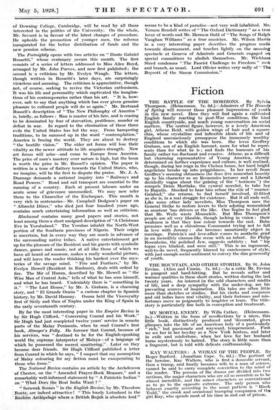Fiction
of Spring will recover those pleasant impressions of you in this new novel. Here they will find again a cultivated English family reacting to post-War conditions, the kind English countryside, and much Young conversation on social matters. The central figure; however, is a lovely American girl, Athene Reid, with golden wings of hair and a square chin, whose crystalline and inflexible ideals of life and of England unconsciously presuppose the immensely wealthy conditions to which she was born. She loves Geoffrey Graham, son of an English baronet, more for what he repre- sents than for what he is ; and finds the humours of his family rather too fluctuant and evasive. Athene, as a difficult but charming representative of Young America, sternly determined on farther experience and culture, is well realized, though, during her reign in-the Chelsea house, her hard bright angelicism breaks up into priggishness. In her revolt' from Geoffrey's seeming obtuseness (he does live somewhat heavily up to his character as an Bconornics lecturer and a Liberal decidedly vague about the, gaining of the " horizons ") she compels Denis Mortlake, the cynical novelist, to take her to Rapallo. Shocked to hear him refuse the role of " courier- Galahad;" she returns, to find herself involved, ill-fitted as she is, in a real struggle for existence. But it all ends well. Like some other lady novelists, Miss Thompson uses the General Strike to restore lovers to their adoring womenkind as amateur 'bus drivers or the like. One Begins to feel glad that Mr. Wells wrote Meanwhile. But Miss Thompson'll people are all very likeable, though lacking in vision : their weakness is that they lose colour towards the end. Baba promises well as a chivalrous Communist trying not to fall in love with Jeremy : she becomes unnaturally abject in marriage. Patricia's sad love-affair comes to aesthetic grief in an incredibly cinema-like scene with an infant. Sir Philip Rosenheim, the polished Jew, suggests subtlety ; but " hip topaz eyes blinked, and were still. ' This is an ingenuous, well-to-do novel, frequently blurred by carelessness of style; with just enough social sentiment to convey the dim generosity of youth.








































 Previous page
Previous page